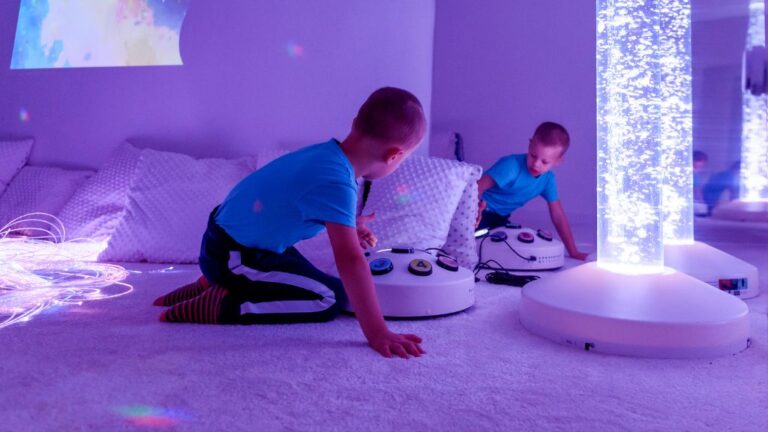For neurodivergent families, everyday routines like going to the grocery store, movie theater, or restaurants can be overwhelming due to sensory overload often associated with autism spectrum disorder (ASD) and other complicated conditions like sensory processing disorders and attention deficit hyperactivity disorder (ADHD). That’s why sensory-friendly spaces are so important. From Orlando to South Florida to your hometown, sensory-friendly areas are becoming more and more accessible and prevalent as more kiddos are identified with autism annually, according to the CDC.
Sensory-friendly spaces are incredible resources that can empower individuals with various sensory uniqueness, enhancing their participation in activities that would otherwise be difficult or overwhelming due to sensory issues or an unpredictable environment. By definition, a sensory-friendly space is a haven for those with sensory processing issues and other conditions.
Environmental factors like noise, lighting, and colors are adjusted in a sensory-friendly space to create a calming atmosphere. Sensory-friendly spaces may even include minimal furniture or specialized sensory-friendly activities. In this blog post by ABA Centers of Florida, we’ll explore why these kinds of areas are so crucial for neurodivergent families, as well as how states like Florida are helping to make them more accessible for everyone.
Recognizing the value and benefits of sensory-friendly spaces is critical for caregivers of those with autism and other developmental conditions. Often, experiencing these spaces leads families to advocate for more inclusive experiences so loved ones can always participate in the world around them and enjoy more epic adventures!
Ultimately, sensory-friendly spaces help those on the spectrum access the mainstream world in the most comfortable way for them. Read on as we dig deeper into this valuable subject and offer insight into some of the best resources available today when creating and finding a supportive setting for neurodivergent individuals to enjoy their days out or at home!
For more information about ABA therapy with ABA Centers of Florida, click this link to learn more us!
Defining Sensory-Friendly Spaces and Why Are They Helpful for Neurodivergent Families
For neurodivergent families, finding a safe and welcoming environment can be challenging when traveling or just designating places you would like to visit with your family. That’s where sensory-friendly spaces can make things more seamless and possible. Experts, specialists, and caregivers design these spaces with the unique needs of people who experience sensory overload in mind. All over Florida, these spaces are gaining popularity as more and more families seek inclusive areas where their loved ones can feel accepted, supported, and accommodated.
Sensory-friendly spaces offer neurodivergent individuals and their families a chance to experience the world comfortably and inclusively. For those who may feel excluded or stressed in traditional environments, these spaces can provide a much-needed sense of belonging and an opportunity to navigate exciting experiences. By prioritizing accessibility and understanding, sensory-friendly rooms help ensure that all Floridians have access to the resources and support they need to thrive in their best way.
Why Individuals with Autism Have Sensory Processing Issues
Individuals with autism are often known for their sensory issues, which can involve difficulties processing and responding to sensory information such as feel, sound, and sight. These struggles can make it difficult for individuals with autism to function in everyday environments that may feel overstimulating.
Understanding the root cause of sensory issues in autism is still an ongoing area of research. Still, according to the National Institute of Medicine, experts hypothesize that sensory issues have to do with differences in how the brain processes sensory information, leading to heightened sensitivity to certain sounds, textures, or smells that may seem typical to others.
Benefits of Sensory-Friendly Spaces
There are many benefits in creating or visiting sensory-friendly spaces if you have a child or teenager with autism. These relaxing spaces can help individuals with autism feel more at ease, reducing their stress and anxiety levels in new settings. Additionally, these spaces can promote learning and development by creating a softer, more nurturing environment.
Sensory-friendly spaces cater to an individual’s unique sensory preferences, providing an inviting environment where everyone can participate in various activities while interacting with others facing similar experiences. Overall, sensory-friendly spaces offer a much-needed time out for individuals with autism and their families, allowing them to enjoy the chance to decompress wherever they are.
Finding Sensory-Friendly Spaces in Florida
For neurodivergent families, there is an ever-present challenge of navigating and existing in environments that can feel chaotic and unsafe even though they feel fun and exciting for others. Safety, security, and inclusion are the things we seek for our neurodivergent children as parents. But often, that can feel hard; fortunately, it doesn’t have to be.
Here are a few tips for finding sensory-friendly spaces in your area:
- Research online for sensory-friendly events in your area. Also, check out sites like Autism Speaks and other autism blogs, including ours.
- Ask local organizations that support individuals with sensory needs if they know of nearby sensory-friendly spaces or have any recommendations.
- List places you enjoy visiting and contact those establishments to see if they offer sensory-friendly options.
Sensory-Friendly Spaces in Florida Are Popping Up Everywhere!
As the importance of sensory-friendly spaces continues to grow and be recognized, more and more companies in Florida are acknowledging the need for environments that welcome everyone. Disney World, Universal Studios, and LEGOLAND are three popular theme parks in Florida that recognize the importance of providing sensory-friendly spaces for individuals with autism.
- At Disney World, guests can request a “DAS” (Disability Access Service) card to schedule designated ride times and avoid standing in long lines, reducing sensory discomfort. Disney also offers quiet rooms, sensory-friendly shows, and dietary options for individuals with diverse medical needs.
- Universal Studios offers designated quiet areas and sensory-friendly shows. Other autism accommodations may be possible upon request.
- LEGOLAND, the theme park, provides designated quiet areas for neurodivergent individuals and others with sensory needs. The parks and resorts have also collaborated with the International Board of Credentialing and Continuing Education Standards (IBCCES) to make their parks and select onsite hotels Certified Autism Centers.
These are just a few examples of the many companies in Florida that have recognized the importance of providing sensory-friendly spaces for individuals with autism and their families.
Fortunately, today, schools are also starting to incorporate sensory-friendly spaces into their classrooms, providing a safe and comfortable environment for students with autism to learn and relax. Even retail stores like Target have introduced “quiet shopping hours” where they lower music and dim lights to cater to individuals with sensory sensitivities.
By creating inclusive environments, these companies and organizations are not only accommodating the needs of individuals with autism but also promoting acceptance and understanding within their communities.
ABA Centers of Florida: The Official Autism Education Partner for the Florida Panthers
Recently, ABA Centers of Florida and the Florida Panthers announced an extension to their sponsorship through June 2025. As part of this agreement, ABA Centers of Florida is designing a sensory room for utilization by all attendees of Amerant Bank Arena, where guests who may become overstimulated by the loud cheers and bright lights can find a few minutes of respite and recenter themselves. For neurodivergent guests who want to soothe on the go, ABA Centers of Florida will also supply sensory packs with headphones, fidget spinners, and other items to alleviate overstimulation. These new additions to the arena are a few examples of how ABA Centers of Florida continues to walk the walk.
Making Your Own Sensory-Friendly Spaces
You can take a few simple steps to establish your own sensory-friendly space at home. The key is to make it a comfortable and calming environment designed to cater to your child’s sensory needs. From incorporating soft lighting and comfortable furniture to adding noise-canceling headphones and fidget toys, there are endless ways to create a space that promotes relaxation and tranquility. By providing a customized and soothing space that suits your loved one’s sensory needs, you can help them feel better sooner.
How ABA Therapy Can Help Neurodivergent Families Cope with Sensory Overload
Sensory processing issues can lead to deficits that impede learning, growth, and socialization in many with autism. Fortunately, ABA therapy, Applied Behavior Analysis, can effectively manage many challenges. Teaching a child to self-regulate is a crucial aspect of their development and a focus of ABA therapy for many.
Implementing ABA strategies and treatment plans designed by Board Certified Behavior Analysts (BCBAs) and Registered Behavior Technicians (RBTs) encourages self-regulation so children and teenagers can learn more efficiently, manage their impulses and emotions more appropriately, and navigate sensory-friendly spaces easily. Other effective ABA strategies may include visual cues, movement breaks, and consistently providing positive reinforcement for desirable behavior and accuracy.
Sensory-friendly spaces complement ABA therapy in many ways, leading to more effective ABA learning. Combining sensory-friendly spaces with effective ABA teaching strategies allows clients to learn how to regulate themselves and enjoy their safe areas.
Sensory-Friendly Spaces for Autism Really Matter
The goal of sensory-friendly spaces should always be to provide an inclusive environment that accommodates those who may be easily overwhelmed in crowded or high-stimulus areas. For neurodivergent families, sensory-friendly rooms are essential because they offer a much-needed break from stress and sensory overload familiar with mainstream settings and events. Overall, sensory-friendly areas minimize tension and promote positive experiences for those most in need.
Overall, the increasing availability of sensory-friendly spaces is not only beneficial for individuals with autism and their families, but it also promotes a more aware and understanding society. By creating these spaces, companies and organizations are not only accommodating the needs of individuals with autism but also showing their commitment to diversity and creating a brighter future.
More about ABA Centers of Florida
ABA Centers of Florida offers ABA therapy invaluable to those seeking help navigating an occasionally hectic world around them. At our ABA therapy agency, we understand the unique challenges of ASD. We are here to provide compassionate ABA care for your loved one’s needs from highly trained ABA experts. Please call us at (772) 773-1975 or contact us now to discuss your loved one’s ABA care, including diagnostic services. Don’t hesitate to contact ABA Centers of Florida now.
We are ready when you are.








